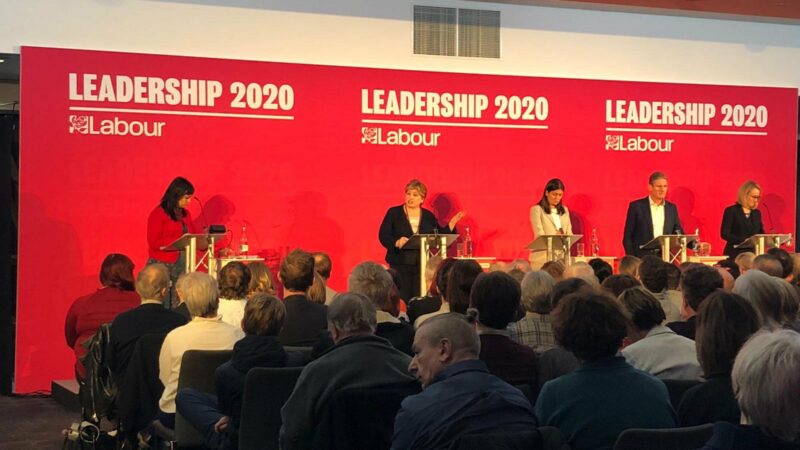
The format continues to stifle debate
Leadership candidates were not offered the chance to deliver opening statements this time – a positive, as those speeches are dull – but they were still only given 40 seconds to respond to questions. Hopes were extinguished as Labour’s procedures committee, which sets out detailed rules for the leadership contest, didn’t change this aspect of the official party hustings. This is a shame, particularly after the hustings organised by Open Labour last weekend showed that 90-second answers were much more illuminating.
Emily Thornberry is still going for it
Despite being the longest-serving MP in the race and the candidate with by far the most experience as a frontbencher, the Shadow Foreign Secretary struggled to pass the MP/MEP nomination threshold in the first stage of the contest. With no chance of securing support from a large trade union, unlike her three rivals, she now needs local party nominations to reach the ballot but is far behind the others with just nine CLPs.
There has been speculation that Thornberry would pull out. Why test whether the Survation estimate of 1% support among members or the YouGov finding of 3% is more accurate? But she showed no sign of plans to pull out soon. Jess Phillips looked as if she’d given up in the first hustings; the same cannot be said of Thornberry today.
It wasn’t just that she was much louder than the other candidates. Thornberry used the hustings to pursue her strategy for CLP nominations: asked about party democracy, she championed members of local parties in Tory safe seats, pointing that they all had their parliamentary candidates imposed on them. “That’s wrong,” Thornberry declared.
(It’s worth noting that Rosena Allin-Khan has won CLP nominations on the same grounds. Wycombe opted for the deputy race outsider because she highlighted the need to support “blue wall” seats, a local source said. It is a good move by both: ‘we’re being ignored by the party, let us be heard’ shows empathy.)
Keir Starmer is gaining confidence
As the frontrunner according to polling and both sets of nominations, Keir Starmer has reason to be feeling cheery – and that confidence was clear this afternoon. He again felt no need to be specific about policy, instead making broad statements about his vision, the need for “fundamental change” and to be clear about “what we stand for”. On housing, he argued that it should be thought of as a “social justice issue”, but didn’t refer to particular measures needed to address these problems.
The difference was found in tone: Starmer was both more relaxed when talking about being a “massive football fan” at the start of the event, and more emotional when discussing his proudest moment as an MP at the end of the session. He also implied that his leadership win was inevitable by skipping over this contest to talk about the one in 2024. “I want to be the Labour Prime Minister of this country,” he told the Bristol audience in no uncertain terms.
Lisa Nandy wants a slice of that Starmer support
Vauxhall CLP nominated Nandy this week, to some surprise. As a strongly pro-EU local party in London, it was expected to go to Starmer. But members made impressive speeches in favour of Nandy, who then raked in enough second preferences to win overall. This is what her campaign would like to see replicated when ballots go out.
The Wigan MP again showed her strength: dropping in lots of soundbites without sounding unnatural, because she scatters them across highly eloquent, smoothly delivered speeches. Nandy was also the first candidate to openly disagree with another, when she said open selections were wrong (“The MPs I want to get rid of are Tories, not Labour”). That will appeal to any Corbynsceptic who thinks Starmer is pitching too far to the left, and it puts an emphasis on electability, which is Starmer’s key selling point.
Rebecca Long-Bailey was strongest on party democracy
For the question on party democracy, she had a four-point plan: 1) improve Labour’s policy-making process; 2) introduce open selections, which got a cheer; 3) better political education; 4) a new BAME organisation. Her promise to “empower you, as members” was reiterated in her closing speech. It was a clear and positive message.
And yet the format, which does not allow interruptions or offer rights of reply, meant she couldn’t come back on Nandy’s point about open selections – and that would have been very useful. The lack of interaction between candidates also meant Long-Bailey didn’t pursue the ‘direct challenge’ approach she has been using in speeches this week, which have seen her call on rivals to match policy commitments on public ownership and green new deal plans. She needed to communicate that Starmer and Nandy are not on the Labour left, and illustrate why that matters, but instead they were perfectly able to coast along without challenge.




More from LabourList
‘The hope that kills you’: Reflections from the final day in Gorton and Denton
MPs, union leaders and organisations react to ‘bruising’ Gorton and Denton result
A gory night for Labour